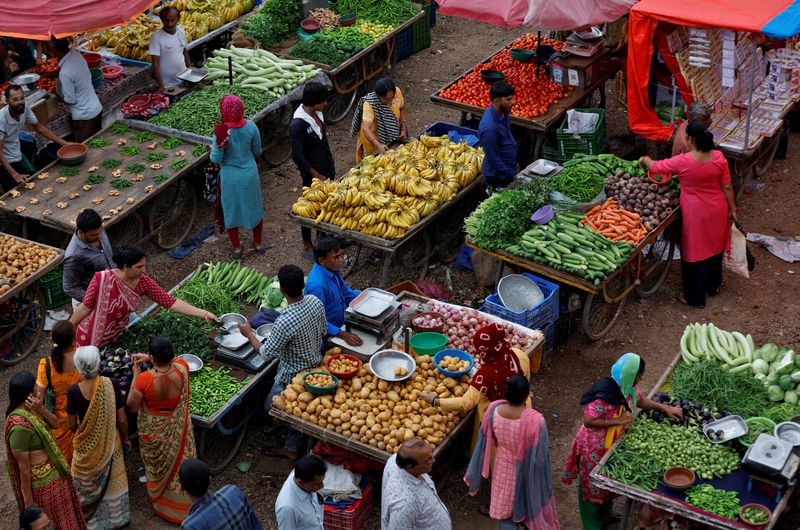By Sarita Chaganti Singh and Manoj Kumar
NEW DELHI (Reuters) -India's retail inflation rate eased slightly in May, partly helped by fall in fuel prices although food prices remained elevated, government data showed on Wednesday.
Annual retail inflation in May was 4.75%, down from 4.83% in April and lower than 4.89% forecast by 50 economists polled by Reuters.
"Inflation surprised on the downside. Moderation in inflation was led by a moderation in core inflation and a decline in fuel inflation," Swati Arora, economist at HDFC Bank said.
Food inflation, which accounts for nearly half of the overall consumer price basket, rose 8.69% year-on-year in May, compared with an 8.70% rise in the previous month. Food prices have been accelerating at more than 8% year-on-year since November 2023.
Core inflation, which strips out food and energy prices, was lower at 3.12% in May, according to two economists, as compared with 3.23% in April. The Indian government does not release core inflation figures.
The inflation rate for cereals was 8.69% year-on-year in May, compared with 8.63% in the previous month. Pulses prices rose 17.14%, compared with 16.84% in April.
Vegetable prices rose 27.3% in May, against 27.8% in the previous month.
Households' spending on food items rose in May, with vegetable prices rising 3.2% month-on-month, while pulses prices gaining 1.5% month-on-month, data showed.
The average cost of home-cooked vegetarian food plate rose 9% in May from a year earlier as onion, tomato and potato prices rose, according to CRISIL, the Indian arm of global rating agency S&P.
Containing food prices will be one of the key focus for Prime Minister Narendra Modi, who was sworn in for the third term on Sunday, after intense criticism for not being able to contain prices of essentials hurt his victory margin.
In its latest monetary policy statement, the Reserve Bank of India (RBI) said an exceptionally hot summer season and low reservoir levels may put stress on the summer crop of vegetables and fruits.
The arrivals of pulses and vegetables need to be carefully monitored, the central bank said.
High food prices have led to the RBI keeping its key interest rate unchanged for eight straight policy meetings, as it wants to bring retail inflation down to 4% on a sustainable basis.

Economists expect the central bank to hold rates until October-December.
"The May print is unlikely to be of consequence for RBI's policy review in August," said Radhika Rao, economist at DBS Bank.